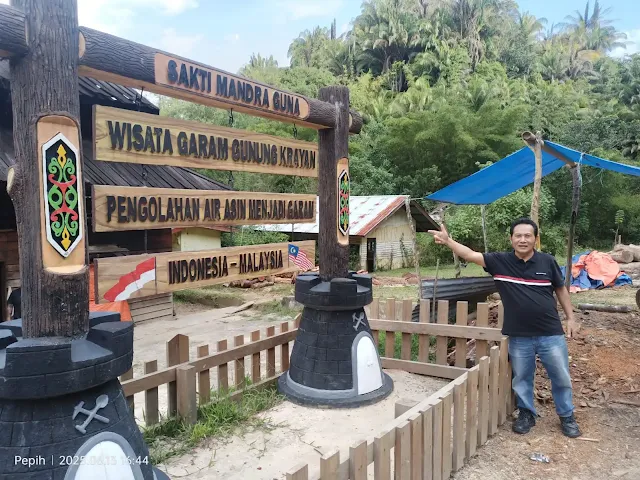Plan your visit to Long Midang and discover the magic of Krayan mountain salt; where tradition, nature, and culture converge.
In the heart of Long Midang, Krayan, Nunukan, North Kalimantan, lies a hidden gem: Krayan mountain salt.
Far from the typical sea salt, this rare commodity is born from ancient saline springs nestled in the mountains, offering a glimpse into the geological wonders and cultural richness of the Dayak Lundayeh community.
A recent study conducted on June 13, 2025, by the Esplindo team: Pepih Nugraha, Yansen TP, Masri Sareb Putra, and Gunawan eveals the intricate process, cultural significance, and burgeoning ecotourism potential of this unique salt.
The Traditional Art of Salt-Making
Unlike conventional salt production, Krayan’s mountain salt is crafted through a time-honored, chemical-free process. Saline water from natural springs, drawn from 4-6 meter deep wells, is boiled in traditional furnaces that burn continuously for 24 hours.
Workers like Sorles and Ainun tend to these fires with unwavering dedication, producing 10-12 kg of pure salt per furnace daily. With nine furnaces in operation, the Long Midang facility yields approximately 33 kg of salt each day, sold at Rp55,000 per kg, contributing roughly Rp1.8 million to the local economy daily. According to the North Kalimantan Central Statistics Agency (BPS) in 2025, this industry accounts for 8% of the region’s economic revenue.
Sorles, a key worker, emphasizes the ritualistic nature of the process: “If the fire goes out, the salt won’t be born.” This reflects not only the technical precision required but also the deep respect for nature’s rhythms embedded in the practice.
A Spiritual and Cultural Symbol
For the Dayak Lundayeh, Krayan salt, known locally as tucu, is more than a culinary ingredient; it’s a sacred element. Used in rituals to purify and unite the community, the salt is regarded as the “blood of the earth,” as described by local cultural figure Elias Yesaya.
The production process itself is a manifestation of local wisdom, fostering patience and devotion. Children like Viola and Saraswati, often seen at the production site, represent the passing of these values to the next generation.
 |
| Mountain salt processing in Long Midang, Krayan, Nunukan Regency, North Kalimantan. Photo credit: Rmsp. |
Beyond its spiritual role, Krayan salt is believed to have medicinal properties, traditionally used to treat skin conditions, diabetes, and hypertension. Its cultural significance is further underscored by proverbs like the Indonesian “banyak makan asam garam” (to have tasted the salt and sour of life) and the Sundanese “uyah tara tees ka luhur” (salt doesn’t rise above its source), symbolizing life’s lessons and ancestral influence.
A Geological Marvel
The existence of salt in Krayan’s mountains is a testament to the region’s ancient past. Millions of years ago, this area was likely a prehistoric sea, leaving behind salt deposits in sedimentary rock layers. Tectonic uplift transformed the region into mountains, and groundwater interacting with these deposits created the saline springs found in places like Long Midang, Pa’Raye, Long Bawan, and Batu Ruyud Binuang.
Krayan salt, now packaged as a local commodity, is an organically produced product that has become one of the region’s flagship goods. Doc. Rmsp.
A 2012 study by Mulawarman University revealed that Krayan salt contains 90.2% NaCl, along with natural minerals like potassium, magnesium, iron, calcium, and iodine, forming distinctive cubic crystals. Similar phenomena are observed in the Himalayas and Andes, marking Krayan as a rare geological treasure.
A Rising Ecotourism Star
Krayan’s mountain salt has become a magnet for travelers seeking authentic cultural and natural experiences. The North Kalimantan Tourism Agency reported a 15% surge in visitors to Krayan over the past two years, drawn by the allure of the traditional salt-making process and the region’s rich Dayak Lundayeh heritage.
The Long Midang facility, marked by a sign reading “Sakti Mandra Guna, Krayan Mountain Salt Tourism,” adorned with Dayak motifs and Indonesia-Malaysia flags, symbolizes cross-border harmony and cultural pride.
Tourists can witness the meticulous salt production process, engage with local artisans, and explore the lush, mountainous landscapes. The salt has also gained international acclaim, fetching 20-60 Ringgit per kg in Malaysia and Brunei. In January 2020, Krayan salt earned a Geographical Indication certificate, solidifying its global reputation and economic value.
A Model for Sustainable Ecotourism
Krayan mountain salt is more than a product; it’s a story of harmony between humanity, nature, and tradition. Its production teaches perseverance, its cultural significance binds communities, and its geological roots connect the present to an ancient past. As an ecotourism destination, it offers a sustainable model that supports local economies while preserving cultural and environmental integrity.
The Esplindo team recommends continued preservation of traditional salt-making practices, improved infrastructure for distribution, and enhanced promotion of Krayan as a must-visit ecotourism destination.
For travelers seeking meaningful experiences, Krayan’s mountain salt is a journey into the heart of North Kalimantan’s soul.
-- Masri Sareb Putra, M.A.


















